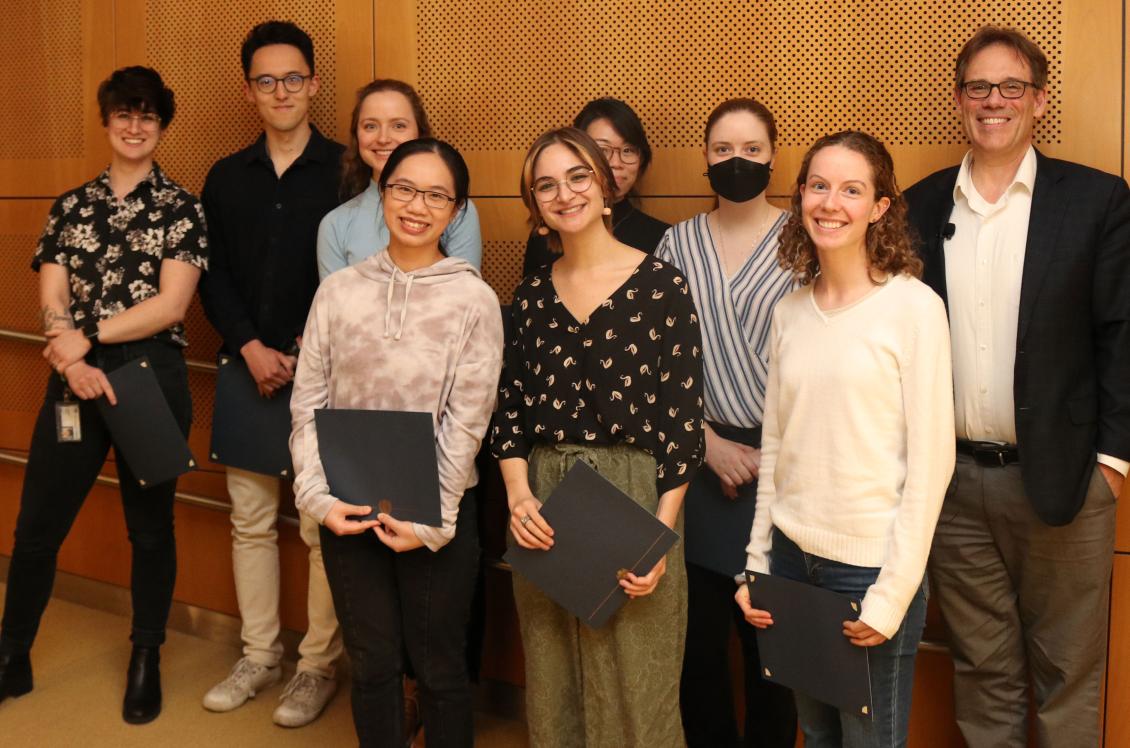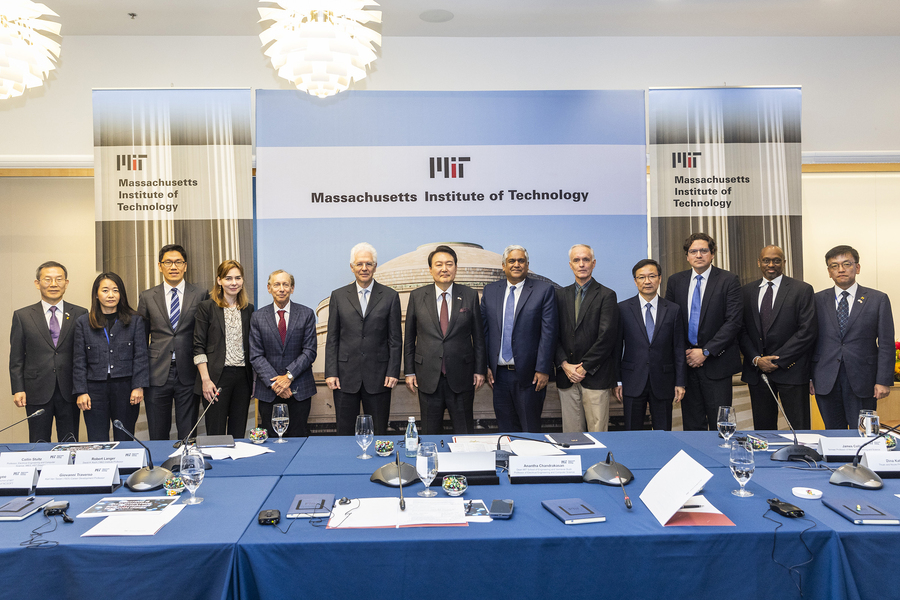No images? Click here
Picower Research & Discoveries
New peptide may hold potential as an Alzheimer’s treatment

The peptide blocks a hyperactive brain enzyme that contributes to the neurodegeneration seen in Alzheimer’s and other diseases
MIT neuroscientists have found a way to reverse neurodegeneration and other symptoms of Alzheimer’s disease by interfering with an enzyme that is typically overactive in the brains of Alzheimer’s patients. When the researchers treated mice with a peptide that blocks the hyperactive version of an enzyme called CDK5, they found dramatic reductions in neurodegeneration and DNA damage in the brain. These mice also showed improvements in their ability to perform tasks such as learning to navigate a water maze. Story continues>>
‘Spatial Computing’ enables flexible working memory

Brain applies rhythms to physical patches of the cortex to selectively control just the right neurons at the right times to do the right things.
Routine tasks that require working memory, like baking, involve remembering both some general rules (e.g. read the oven temperature and time from the recipe and then set them on the oven) and some specific content for each instance (e.g. 350 degrees for 45 minutes for a loaf of rye, but 325 degrees for 8 minutes for cookies). A new study provides a novel explanation for how the brain flexibly manages the general and specific components of such cognitive demands. Story continues>>
Neuroscientists identify cells especially vulnerable to Alzheimer’s

Neurons that form part of a memory circuit are among the first brain cells to show signs of neurodegeneration in Alzheimer’s disease.
One of the first brain regions to show neurodegeneration in Alzheimer’s disease is a part of the hypothalamus called the mammillary body. In a new study, MIT researchers have identified a subset of neurons within this body that are most susceptible to neurodegeneration and hyperactivity. They also found that this damage leads to memory impairments. Story continues>>
Studying consciousness without affecting it

A new study tests an alternative to external stimulation for measuring when subjects lose and regain responsiveness during sedation and anesthesia.
Studies of consciousness often run into a common conundrum of science—it’s hard to measure a system without the measurement affecting the system. Researchers assessing consciousness, for instance as volunteers receive anesthesia, typically use spoken commands to see if subjects can still respond, but that sound might keep them awake longer or wake them up sooner than normal. A new study not only validates a way to assess consciousness without external stimulation, it also finds that it may be more precise. Story continues>>
Fluid flow in the brain can be manipulated by sensory stimulation

Blood flow induced by visual stimulation drives the flow of cerebrospinal fluid
The flow of cerebrospinal fluid in the brain is linked to waking brain activity, according to a new study publsihed in the open access journal PLOS Biology on March 30. The research demonstrates that manipulating blood flow in the brain with visual stimulation induces complementary fluid flow. The findings could impact treatment for conditions like Alzheimer’s disease, which have been associated with declines in cerebrospinal fluid flow. Story continues>>
Picower People
Meet new faculty members Brady Weissbourd and Sara Prescott

Sara Prescott studies ‘interoception’ –the brain’s sense of the body’s organs—while Brady Weissbourd examines behavior and evolution in a new model: jellyfish.
This spring two new MIT biology faculty members joined The Picower Institute, bringing unique research programs that expand the scope of the Institute’s neuroscience studies. Learn more about their work and interests via these Q&As.
Sara Prescott on the brain-body connection
Brady Weissbourd on a new model of nervous system form, function, and evolution
Welcome new affiliate Laura Lewis
This spring The Picower Institute welcomed its newest affiliate faculty member, Laura Lewis, Athinoula A. Martinos Associate Professor in the Department of Electrical Engineering and Computer Science and MIT’s Institute for Medical Engineering and Science. Lewis, who earned her PhD in 2014 in the Picower Institute lab of Emery N. Brown, became an MIT faculty member in February after serving as an assistant professor at Boston University. Her research focuses on neuroimaging approaches that better map brain function, with a particular focus on sleep. She is developing computational and signal processing approaches for neuroimaging data and applying these tools to study how neural computation is dynamically modulated across sleep, wake, attentional, and affective states.

Associate Professor Laura Lewis
Congratulations to Picower's newest PhDs
Five graduate students in Picower Institute labs earned PhDs recently. Their research spanned diverse topics: The cells that compose the brain’s blood vessels and how they matter to health and disease; analyses of how a worm’s nervous system produces its behaviors; study of a protein critical for the structural integrity of the axon projections neurons use to send signals across synaptic connections; and research on another protein important for ensuring proper neurotransmitter release at those synaptic junctions.
Congratulations to them all:
Dr. Adam Atanas, Flavell Lab, “Brain-wide representations of behavior spanning multiple timescales and states in C. elegans”
Dr. Elizabeth Brija, Littleton Lab, “Stochastic RNA editing of the Complexin C-terminus within single neurons regulates neurotransmitter release in Drosophila”
Dr. Francisco Garcia, Heiman Lab, “Molecular Profiling and Mechanisms of Cerebrovascular Function in Health and Neurodegeneration”
Dr. Ellen Guss, Littleton Lab, “The heparan sulfate proteoglycan Perlecan regulates axonal and synaptic stability"
Dr. Jungsoo Kim, Flavell Lab, “The Flexible Mind of a Worm: the atlas of brain-wide representations of behavior in C. elegans”

Dr. Jungsoo Kim

Dr. Elizabeth Brija
Picower members earn BCS department awards

Kudos to the several Picower Institute members who won awards this spring from the Department of Brain and Cognitive Sciences (BCS)! Picower Professor and Institute Director Li-Huei Tsai earned the BCS Award for Excellence in Graduate Student Mentorship. Graduate students Leyla Akay (Tsai Lab), Kendyll Burnell (Nedivi Lab), and Di Kang (Flavell Lab) earned the Angus MacDonald Award for Excellence in Undergraduate Teaching (winners pictured above), and Gregg Heller (Sur Lab) earned a Walle Nauta Award for Excellence in Graduate Teaching.
Kwanghun Chung part of MIT delegation hosting president of South Korea

President Yoon Suk Yeol of South Korea visited MIT on April 28 for a campus summit centered around dialogue on biotechnology and innovation ecosystems. Among six MIT faculty members who spoke to Yoon about different aspects of biotechnology and enhancing innovation was Associate Professor and Picower Institute member Kwanghun Chung (third from left in photo; President Yoon is in center). According to MIT News, Chung was asked to talk about the different components making up a successful innovation ecosystem. He noted that the process was analogous to seeding many things in nature, in order to create extensive growth. His remarks drew a response from Yoon, who added, “I realize such a forest doesn’t happen overnight.” Story continues>>
Spring break tours give high schoolers a chance to see science up close

Teens from area high schools learned about advanced biology and brain research on field trips to MIT
Even during MIT’s spring break the halls of the university’s life sciences buildings were still teeming with young students. That’s because on March 29 and 30 scores of students from six area high schools filled the void by the busload to learn about biology and brain science, including from several members of The Picower Institute. Story continues>>
In the media
The MIT spin-off company co-founded by Li-Huei Tsai and Picower affiliate member Ed Boyden earned headlines in Business Insider and The Boston Globe recently for launching a phase III clinical trial of 40 Hz sensory stimulation to potentially treat Alzheimer's disease. Fast Company magazine featured the technology as part of an excerpt of the book "Your Brain on Art." The Tsai Lab's neurodegeneration-fighting peptide caught the attention of news outlets including the New York Post and the Daily Mail (UK) as well as Consumer Affairs.
Earl Miller's spatial computing research earned coverage from BrainPost and figured into a podcast he recorded with Brain Inspired. Emery N. Brown also appeared in a recent Heads Talk podcast where he discussed integrating neuroscience with aneshtesiology and statistics.
Upcoming Events
A note about events: Event schedules and details are subject to change. Please check associated links frequently in advance of events that interest you.
Register now for the Picower Institute Spring Symposium!
'Environmental and Social Determinants of Child Mental Health' on May 11
Abuse, neglect, trauma or adverse experiences during childhood coming from personal, environmental or social sources can lead to lifelong struggles with mental health. Fortunately research also indicates that solutions and interventions at various stages of life can be developed to help and to promote resilience. Please plan to join us online or in person on May 11, 2023 to hear from leading speakers about various ways people are working to help. Click "Register," or the image above, to see the list of terrific speakers and to join us. Register>>
Save the date : Oct. 23, 2023
Cutting Edge Approaches to Studying the Aging Brain

Save the Date: Dec. 11, 2023
The 2023 Picower Lecture with Catherine Dulac, HHMI, Harvard University

Upcoming colloquia and Aging Brain Initiative seminars
- October 12: Colloquium on the Brain and Cognition with David Freedman, PhD, University of Chicago More>>
- November 7: Aging Brain Seminar with Julia TCW, PhD, Boston University More>>
- November 30: Colloquium on the Brain and Cognition with Jennifer Li, PhD, & Drew Robson, PhD, Max Planck Institute for Biological Cybernetics More>>


